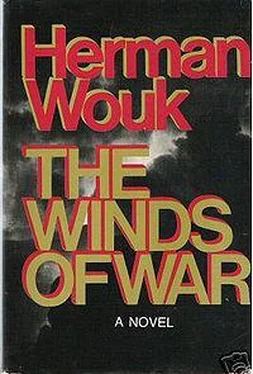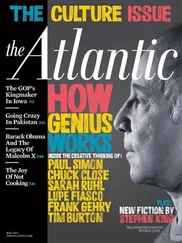Herman Wouk - The Winds of War
Здесь есть возможность читать онлайн «Herman Wouk - The Winds of War» весь текст электронной книги совершенно бесплатно (целиком полную версию без сокращений). В некоторых случаях можно слушать аудио, скачать через торрент в формате fb2 и присутствует краткое содержание. Год выпуска: 1971, Издательство: Collins, Жанр: Историческая проза, на английском языке. Описание произведения, (предисловие) а так же отзывы посетителей доступны на портале библиотеки ЛибКат.
- Название:The Winds of War
- Автор:
- Издательство:Collins
- Жанр:
- Год:1971
- ISBN:нет данных
- Рейтинг книги:4 / 5. Голосов: 1
-
Избранное:Добавить в избранное
- Отзывы:
-
Ваша оценка:
- 80
- 1
- 2
- 3
- 4
- 5
The Winds of War: краткое содержание, описание и аннотация
Предлагаем к чтению аннотацию, описание, краткое содержание или предисловие (зависит от того, что написал сам автор книги «The Winds of War»). Если вы не нашли необходимую информацию о книге — напишите в комментариях, мы постараемся отыскать её.
About the Author
Herman Wouk's acclaimed novels include the Pulitzer-Prize winning
;
;
;
;
;
; and
.
The Winds of War — читать онлайн бесплатно полную книгу (весь текст) целиком
Ниже представлен текст книги, разбитый по страницам. Система сохранения места последней прочитанной страницы, позволяет с удобством читать онлайн бесплатно книгу «The Winds of War», без необходимости каждый раз заново искать на чём Вы остановились. Поставьте закладку, и сможете в любой момент перейти на страницу, на которой закончили чтение.
Интервал:
Закладка:
“How can he care? Why, he’s famous.”
“He cares. God, how they care.” With a clumsy little wave, she went inside.
After breakfasting alone, Pug went to the library. Nobody was there but a boyish steward. The shelves held many German volumes on the World War. Pug glanced at one titled U-Boats: 1914-18 , and settled into a leather armchair to scan the discussion of American destroyer tactics. Soon he heard the scratch of a pen. At a small desk almost within his reach, the German submarine man sat with his bristly head bent, writing. Pug had not seen him come in.
Grobke smiled, and pointed his pen at the U-boat book. “Recalling old times?”
“Well, I was in destroyers.”
“And I was down below. Maybe this is not the first time our paths cross.” Grobke spoke English with a slight, not unpleasant Teutonic accent.
“Possibly not.”
“When Pug put the U-boat volume on the shelf and took down the Tudsbury book, Grobke remarked, “Perhaps we could have a drink before dinner and compare notes on the Atlantic in 1918?”
“I’d enjoy that.”
Pug intended to read Tudsbury in a deck chair for a while and then go below to work. He had brought weighty books on German industry, politics, and history, and meant to grind through the lot on the way to his post. Intelligence manuals and handbooks were all right, but he was a digger. He liked to search out the extra detail in the extra-discouraging looking fat volume. Surprising things were recorded, but patient alert eyes were in perpetual short supply.
The bow wave was boiling away, a V of white foam on the blue sunlit sea, and the Bremen was rolling like a battleship. Wind from the northwest, Pug estimated, glancing up at the thin smoke from the stacks, and at the sea; wind speed fifteen knots, ship’s speed eighteen, number four sea on the port quarter, rain and high winds far ahead under the cumulo-nimbus. Nostalgia swept over him. Four years since he had served at sea; eleven since he had had a command! He stood by the forward rail, leaning against a lifeboat davit, sniffing the sea air. Four unmistakable Jews walked by in jolly conversation, two middle-aged couples in fine sports clothes. They went out of sight around the deckhouse. He was still looking after them when he heard Tudsbury blare, “Hello there, Commander. I hear you were out walking my Pam at the crack of dawn.”
“Hello. Did you see those people who just went by?”
“Yes. There’s no understanding Jews. I say, is that my book? How touching. How far have you got?”
“I just drew it from the library.”
Tudsbury’s moustache drooped sadly. “What! You didn’t buy it? Damn all libraries. Now you’ll read it and I won’t gain a penny by it.” He bellowed a laugh and rested one green-stockinged leg on the rail. He was wearing a baggy pepper-and-salt golfing outfit and a green tam o’shanter. “It’s a bad book, really a fake, but it’s selling in your country, luckily for me. If you didn’t happen to hear my drivelling on the air in the past year or two, there are a couple of interesting paragraphs. Footnotes to history. My thing on Hitler’s entry into Vienna is actually not too awful. Quite a time we’re living in, Commander.”
He talked about the German take-over of Austria, sounding much as he did on the air: positive, informed, full of scorn for democratic politicians, and cheerfully ominous. Tudsbury’s special note was that the world would very likely go up in flames, but that it might prove a good show. “Can you picture the bizarre and horrible triumph that we let him get away with, dear fellow? I saw it all. Something straight out of Plutarch, that was! A zero of a man, with no schooling, of no known family — at twenty a dropped-out student, a drifter and a failure — five years a dirty, seedy tramp in a Vienna doss house — did you know that Henry? Do you know that for five years this Führer was what you call a Bowery bum, sharing a vile room with other assorted flotsam, eating in soup kitchens, and not because there was a depression — Vienna was fat and prosperous then — but because he was a dreamy, lazy, incompetent misfit? That house painter story is hogwash. He sold a few hand-painted postcards, but to the age of twenty-six he was a sidewalk-wandering vagrant, and then for four years a soldier in the German army, a lance corporal, a messenger-runner, a low job for a man of even minimum intelligence, and at thirty he was lying broke, discharged, and gassed in an army hospital. That is the background of the Führer.
“And then -” The ship’s horn blasted, drowning out Tudsbury’s voice, which was beginning to roll in his broadcasting style. He winced, laughed, and went on: “And then, what happened? Why, then this same ugly, sickly, uncouth, prejudiced, benighted, half-mad little wretch leaped out of his hospital bed, and went careering in ten years straight to the top of a German nation thirsting for a return match. The man was a foreigner, Henry! He was an Austrian. They had to fake up a citizenship proceeding for him, so he could run against Hindenburg! And I myself watched this man ride in triumph through the streets of Vienna, where he had sold postcards and gone hungry, the sole heir to the combined thrones of the Hapsburgs and the Hohenzollerns.” Victor Henry smiled, and Tudsbury’s impassioned popeyed stare gave way to a loud guffaw. “A-hawr, hawr, hawr! I suppose it is rather funny when you think about it. But this grotesque fantasy happens to be the central truth of our age.”
Henry was smiling because much of this tirade was in Tudsbury’s book, almost word for word. “Well, it’s the old story of the stitch in time,” he said. “Your politicos could have got the weird little bastard with no trouble early on, but they didn’t. Now they have problems. Incidentally, where are you headed? Berlin, too?”
Tudsbury nodded. “Our Berlin man’s prostate chose an awkward time to act up. A-hawr-hawr! Dr. Goebbels said I could come along and fill in. Amazement! I’ve been persona non grata in the Third Reich since Munich. No doubt I’ll be kicked out on my big arse in a few weeks. For some reason the Jerries are being kind to Englishmen this month. Probably so we’ll hold still while they roll over the Poles. And we will, we will. The Tories are all polite gray worms. Aristocratic funks, Lloyd George called them. Except for Churchill, who’s quite out of it.”
The American commander and the U-boat man took to meeting in the bar each evening before dinner. Henry figured that it was his job to pump Grobke, as it might well the German’s to work on him. Grobke was a thorough professional, an engineering expert, and a real seafarer. He talked freely about the machinery in the present U-boats, and even confessed to problems with torpedoes, a topic Henry was well versed in, though he discussed it cautiously. In Grobke’s harassed disdain for politicians, he seemed like any American naval man. A satiric look came on his face when he spoke of the Nazis, and he said things that caused his wife, when she was with them, to give him warning glances.
“Alistair Tudsbury said to Pug one evening, as they sat on a couch in the main saloon watching the dancing, “You’ve been fraternizing with Jerry.”
“In the line of business. I doubt Grobke’s a Nazi.”
“Oh, those U-boat fellows are all right, as much as any Germans are.”
“You don’t like the Germans.”
“Well, let’s talk about that after you’ve been there a month. Assuming I haven’t been booted out.”
“Of course I don’t blame you. They gave your people hell.”
“No worse than we gave them. We won, you know.” After a pause he said, “My eyes were spoiled at Amiens, when we broke through with the tanks. I commanded a tank battalion, and was gassed. It was worth it, all in all, to see Jerry on the run. It was a long time coming.”
Читать дальшеИнтервал:
Закладка:
Похожие книги на «The Winds of War»
Представляем Вашему вниманию похожие книги на «The Winds of War» списком для выбора. Мы отобрали схожую по названию и смыслу литературу в надежде предоставить читателям больше вариантов отыскать новые, интересные, ещё непрочитанные произведения.
Обсуждение, отзывы о книге «The Winds of War» и просто собственные мнения читателей. Оставьте ваши комментарии, напишите, что Вы думаете о произведении, его смысле или главных героях. Укажите что конкретно понравилось, а что нет, и почему Вы так считаете.












